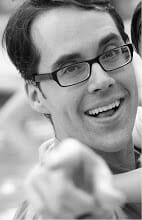Blind 4-Month-Old Saved by Newborn's Umbilical Cord, Donor Found 15 Years Later
DNA-testing kits have exploded onto the market, billing themselves as fun ways for you to discover your genetic roots. But for one Long Island, New York, mother, it helped her find the person who saved her son’s life.
The story started on July 22, 2002, when a woman named Tracey Dones delivered her firstborn son, little Anthony. But the joy of that birth soon turned into terror.
“He was not thriving,” Dones told ABC News. “He just looked off to me.”
Sadly, her hunch paid off. When Anthony reached the age of four months, doctors discovered he had malignant infantile osteopetrosis, a dangerous genetic disorder.
In addition to making bones brittle, it also can lead to blindness — which is exactly what happened to Anthony.
“It was like my whole world was falling apart completely,” Dones said. Indeed, physicians told her that her baby would perish if not for radical intervention.
Fortunately, unexpected help had already arrived.
By searching the records of the New York Blood Center, an institution that stores donated umbilical-cord blood, they were able to find a match for Anthony.
By shocking the little baby’s system with eight days of chemotherapy and introducing the stem-cell-rich cord blood, Anthony’s life took a dramatic turn for the better.
And his tale got even more amazing when Dones decided to try out AncestryDNA’s tests some 15 years later.
To her surprise, Anthony had a higher concentration of Eastern European ancestry than she did, a shock since his father hailed from Puerto Rico.
But a quick check with the company revealed that the test was picking up on the DNA from the cord-blood donor.
What’s more, AncestryDNA had a relative of the donor on file. “For 15 years, I’ve thought of this woman and how she saved my son’s life,” Dones marveled.
The woman’s name was Patti Bosques, and ironically enough, she had no memory of donating her own son’s umbilical-cord blood. But the proof of it was there, running through Anthony’s veins.
Thanks to social media, the two women connected, and 15 years later, Anthony was able to meet the people who saved his life. “It’s very overwhelming,” Bosques said.
“When I donated the cord blood, I thought it was going to be used more for research. I certainly didn’t think it would have such an individual impact on one person.”
Truth and Accuracy
We are committed to truth and accuracy in all of our journalism. Read our editorial standards.
Advertise with The Western Journal and reach millions of highly engaged readers, while supporting our work. Advertise Today.












